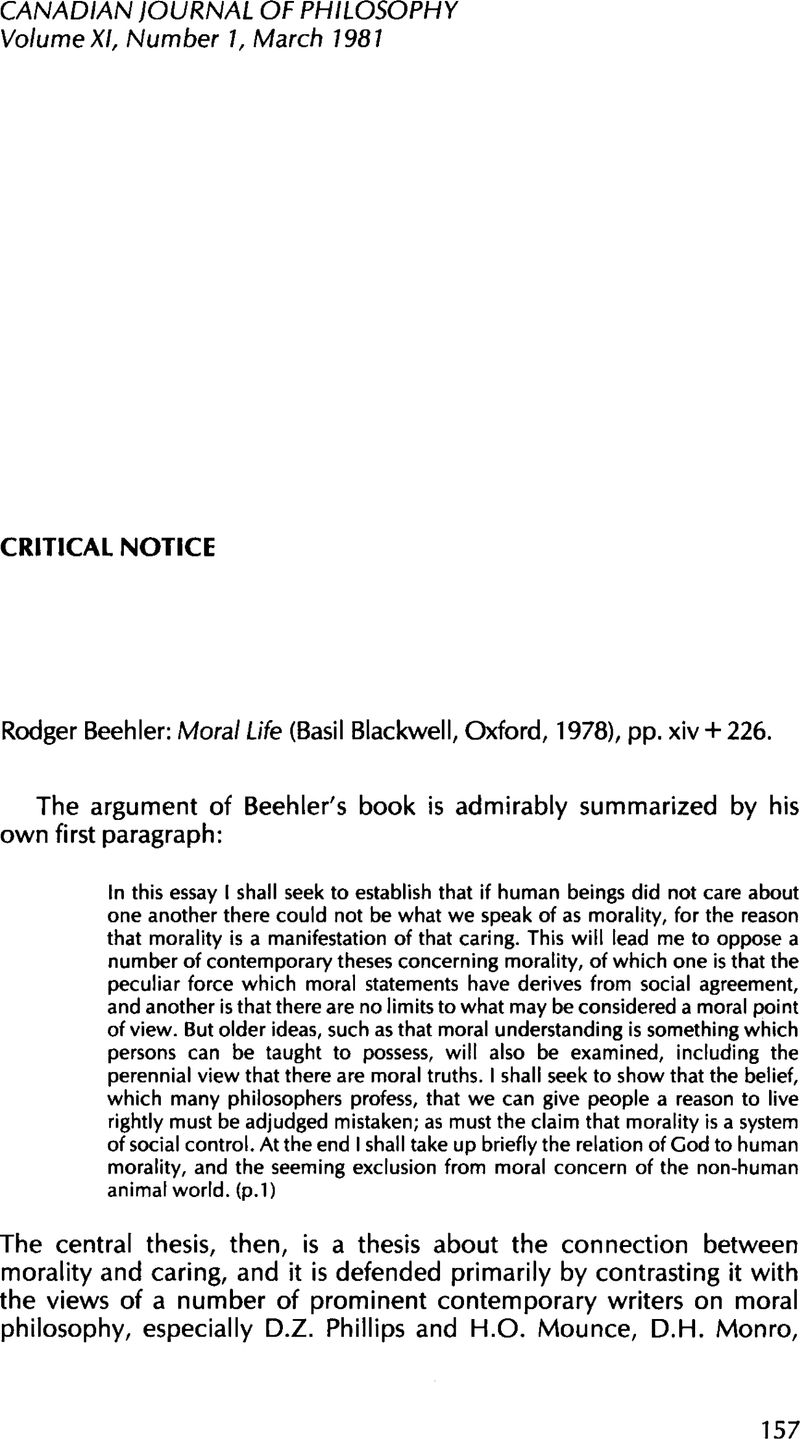No CrossRef data available.
Article contents
Rodger Beehler: Moral Life (Basil Blackwell, Oxford, 1978), pp. xiv + 226.
Review products
Published online by Cambridge University Press: 01 January 2020
Abstract

- Type
- Critical Notice
- Information
- Copyright
- Copyright © The Authors 1981
References
1 Hume: An Inquiry Concerning the Principles of Morals (Bobbs-Merrill, New York, 1957) section V, part II, p. 55f.
2 I have also to accept that, to some extent, his criticisms would be applicable to my own version of Wittgensteinian ethics, in my book Reasons for Actions (Blackwells, Oxford, 1971). Though less inclined, I think, than Phillips and Mounce to locate ‘the given’ in linguistic meaning-rules, I nevertheless incline too far in that direcion, and have therefore found Beehler's book a useful corrective.
3 Wittgenstein sometimes comes close to such a suggestion; cf. Philosophical Investigations, (Blackwell, Oxford 1958) para. 244: ‘Here is one possibility: words are connected with the primitive, the natural, expressions of the sensation and used in their place. A child has hurt himself and he cries; and then adults talk to him and teach him exclamations and, later, sentences. They teach the child new pain-behaviour.’ But then notice how Wittgenstein immediately guards against a simple assimilation of pain-statements to crying: ‘“So you are saying that the word ‘pain’ really means crying?” — On the contrary: the verbal expression of pain replaces crying and does not describe it.)
4 This may be too simple. Beehler's remarks about the complexity of people's attitudes, the fact that they may deliberately hurt those they love (p.53), are relevant here ― but I do not think that they take us far enough.
5 For an extended criticism of the Kantian attack on the altruistic emotions, see Blum, Lawrence: Altruism, Emotion and Morality (Routledge and Kegan Paul, forthcoming).Google Scholar This book is an excellent discussion of the place of the altruistic emotions (such as ‘caring’) in morality.
6 This, I would say, is Kant's position in the Groundwork. Beehler himself finds a more congenial position in the Metaphysic of Morals. Interestingly, the passage which he quotes from that work (on p.128) is much closer to being a statement of the Background-condition Thesis than the Identity Thesis.
7 Skillen, Anthony in his book Ruling Illusions (Harvester, Hassocks, 1977)Google Scholar is excellent on this — see especially pp. 157-164.
8 On p. 198 Beehler explicitly asserts that ‘justice, in so far as it calls for the equal treatment of cases, does tend to work against the exercise of mercy or generosity.’ How is this possible? If Justice and mercy are both based on caring, they must at any rate be based on it in different ways. (On p.201 the difference seems to be abolished again — ‘mercy is here on the side of Justice.’)
9 Pets and other domesticated animals are an exception — but are thereby, perhaps, drawn into human society.
10 I have tried to develop this idea in my article ‘Self and Others: the Inadequacy of Utilitarianism', in Canadian Journal of Philisophy, Supplementary Volume 5 (1979).
11 Eliot, George: Silas Marner, ed. Leavis, Q.D. (Penguin, Harmondsworth 1967) p. 184.Google Scholar




